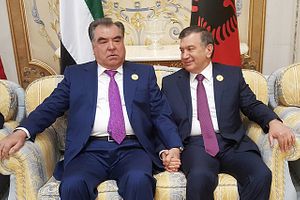Uzbek President Shavkat Mirziyoyev is expected to visit Tajikistan soon. Tajikistan remains the only Central Asian country the Mirziyoyev has not visited in his first year at the helm of Central Asia’s central and most populous country.
In remarks on January 6, Mirziyoyev said preparations for an official visit were underway and that important bilateral agreements would be signed.
This week, Uzbek Prime Minister Abdulla Aripov is scheduled to make a working visit to Dushanbe to pave the way for the president’s visit. According to Trend, Aripov will meet with Tajik President Emomali Rahmon and Prime Minister Kokhir Rasulzoda. Regional media have reported that the usual topics are on the agenda: trade and economic cooperation as well as demarcation and delimitation of borders. Mirziyoyev mentioned in his January 6 comments that cooperation in the railway and energy sectors would be on the agenda.
Mirziyoyev noted the difficulty of repairing the bilateral relationship between the two states, saying that while it is necessary to establish good relations with all of the country’s neighbors, melting ice that has been frozen for 20 years is not an easy task.
After becoming president in late 2016 following the death of Islam Karimov, Mirziyoyev embraced a good neighbor policy that has led to a rekindling of regional ties. Border agreements have been signed with Kyrgyzstan, as well as Kazakhstan and Turkmenistan. Mirziyoyev has made a number of momentous trips, including the first by an Uzbek president to Turkey in 18 years. A steady stream of accomplishments have accumulated, though many — like the resumption of regular bus service between Tashkent and Shymkent, Kazakhstan — are rather low-hanging fruit which don’t require a huge lift to enact.
One early accomplishment underscored the absurd depths into which Uzbek-Tajik relations had fallen. In April 2017, direct flights resumed between Tashkent and Dushanbe for the first time in 25 years.
Uzbek-Tajik relations began souring quickly after independence. As Tajikistan fell into civil war, Uzbekistan’s Karimov battened down the hatches, determined that instability would find no footing in his country. The end of the Tajik Civil War in 1997 did little to soften relations. In 1999, after a series of bombings in Tashkent, Uzbekistan mined its border with Tajikistan. While efforts were made to clear the landmines, up through at least 2009 there were still occasional deaths on the border.
In 2009, Uzbekistan withdrew from the Soviet era regional power grid, leaving Tajikistan and Kyrgyzstan in a lurch when it came to winter when both needed to import electricity. The grid had been built before the borders became international lines. Kyrgyzstan supplied its southern region via lines that crossed Uzbek territory, and Tajikistan imported electricity from Turkmenistan via Uzbekistan. Both imported from Uzbekistan during winter.
The Uzbek withdrawal and subsequent winter energy shortages in Tajikistan and Kyrgyzstan added motivation for Bishkek and Dushanbe to complete pending hydropower projects and find other partners. Tajikistan leaned heavy on getting the massive Rogun dam project back on track. Tashkent complained that the dam would significantly impact the flow of water out of Tajikistan on which Uzbekistan’s agricultural sector — especially thirsty cotton — relies. Karimov’s complaints went as far as suggesting scarce water resources could touch off a war.
With the Rogun dam project making active progress again, the issue is poised to be a critical one between the neighbors. Mirziyoyev and his administration have been careful about how they’ve discussed the issue of water resources broadly, and Rogun, in particular. As I noted last summer, the Uzbek leadership has not necessarily changed position but it has changed its tone from confrontational to constructive.
While Mirziyoyev’s near future visit to Tajikistan will be his first as president, it will not be his first interaction with his Tajik counterpart. Back in May 2017, the two were literally holding hands on a couch at the 2017 Riyadh summit.

































